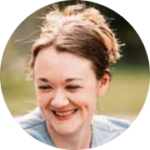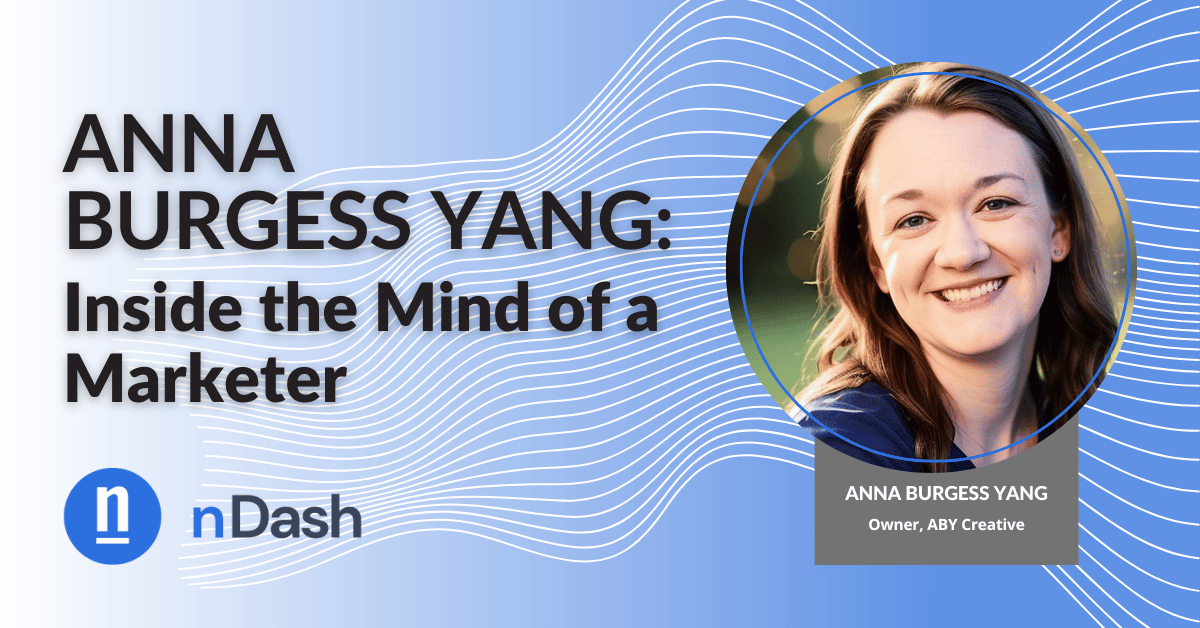We’re back with another marketer interview as part of our “Inside the Mind of a Marketer” series. This time, nDash’s Managing Editor, Jenn Greenleaf, talks to Anna Burgess Yang about her background, experiences, and strategies as a FinTech content marketer and freelance writer.
Background: The Highlights
In 2021, Anna left her corporate executive position in a fintech company and embarked on a new career path. Eighteen months later, she took a bold step to bet on herself and transitioned to becoming a full-time freelance writer and solopreneur.
Leveraging her extensive executive experience, Anna quickly grew her solo business by effectively utilizing tools and automating processes. For her, the life of a solopreneur has always been liberating rather than overwhelming, allowing her to manage her time efficiently and focus on meaningful work.
Anna is passionate about empowering other one-person businesses to take control of their time, streamline their processes, and eliminate tedious tasks. She creates valuable resources for solopreneurs, including eBooks, courses, and a newsletter.
Additionally, Anna offers 1:1 consulting to help individuals enhance their business operations, sharing her expertise to support others in achieving a more efficient and fulfilling solopreneur lifestyle.
nDash’s Marketer Interview with Anna Burgess Yang
Jenn: To start, as a former product manager in B2B loan risk management, what lessons from this role do you think were most valuable in your current writing?
Anna: Product management is really about managing projects and expectations, both of which have been invaluable to my work as a freelance writer. A lot of freelance writers are great at their craft—they know how to write and create work for clients.
But there’s a whole other business side to managing multiple clients and deadlines and knowing how to juggle all of that. My experience as a product manager helped me prioritize different tasks, complete projects, and ensure they were done on time and as expected.
Jenn: Could you elaborate a little on your role as a product manager in the FinTech industry and how it informs your approach to content creation?
Anna: As a product manager, part of my job was understanding what users expected from an end result. This sometimes meant talking to users or understanding the industry and how the product impacted their day-to-day activities. I would then put this into a larger project timeline and set expectations for stakeholders like executives or the Head of Development.
As a content marketer, I need to understand the industry well, interview people, and manage multiple clients and deadlines. Even though I changed industries, I can borrow a lot of the skills I used before and apply them to content marketing.
Jenn: You mentioned getting a lot of projects done and meeting timeframes. As a marketer, what is your stance on using AI tools to streamline workflows?
Anna: As a niche expert, I don’t use AI for content creation itself. I rely on my expertise and experience. However, I do use AI tools for prep work, like working on an outline to ensure I’m covering everything or on the back end to double-check my work.
AI can help me catch things I might have missed. For example, using AI transcripts to pull out key points from an interview. These tools help speed up the process and serve as a supplement to my work.
Jenn: Have you found any mistakes or challenges when using AI tools?
Anna: Yes, sometimes. For instance, AI might pull a quote incorrectly, so I always listen back to the interview to ensure accuracy. Summaries are great for giving key ideas, but I need to go back and verify details. AI can mix up speakers, especially with multiple interviewees, so I always double-check the work. It’s more of a launching pad.
Jenn: You do a lot of interviews. What challenges do you face when trying to find subject matter experts and align them with your content or project goals?
Anna: Scheduling is the hardest part. Often, my clients will connect me with a subject matter expert, but getting them to commit to a time can be difficult. I try to make it easy by sending interview questions ahead of time or providing a Calendly link.
If multiple interviewees are involved, coordinating can be even tougher. Because I’ve been in FinTech for so long, I have a wide network on LinkedIn that I can tap into. Most of the time, I’m not just reaching out to strangers; it’s usually someone I’ve been connected with, which helps.
Jenn: How do you balance journalism, content marketing, and workflow resources in your career?
Anna: I struggle with it, as I’m sure many people do. There are always so many things I want to do, and only so much time in the day. I use time-blocking a lot. And I know that certain parts of my day are blocked for client work because I have deadlines.
I wake up very early, around 4 a.m., to work on personal projects like creating resources for freelancers. My day is divided into blocks for client work, personal projects, and administrative tasks, which helps me stay on track and balanced.
Jenn: As a marketer, do you intentionally set a block of time for breaks or walks to ensure you’re not always working?
Anna: Yes, I do. I usually have a morning block from when my kids go to school until about 10:30 am or 11:00 am. Then, I take a long break for lunch, a walk, or some downtime. I have another block in the afternoon for additional client work if needed. My day is bookended by family time, with spillover time in the evening if necessary. This routine helps me hit deadlines while maintaining a work-life balance.
Jenn: As a solopreneur, what advice do you have for other parents trying to balance work and family, especially when managing stress or dealing with a sick child?
Anna: When something unexpected comes up, like a sick child, I hope clients understand that things happen. I’ll ask for an extra day if needed. As a parent, I try to model good work boundaries for my kids. They know when my office door is shut, I’m working.
However, I also show them that once evening hits, I’m usually done working and spending time with them. It’s about balancing obligations and showing them how to manage both work and family.
Jenn: Can you share some key learnings from working at content agencies that you apply to your current endeavors?
Anna: In my role as a content marketing manager at an agency, I was matched well with my clients because they were very product management-focused, and I had been a product manager. I learned that being in your niche helps tremendously. Staying within my industry expertise allowed me to transition smoothly into content marketing.
I learned about outlining and idea generation and working with an editor gave me valuable feedback. While I don’t focus on analytics in my current role, I strive to produce high-quality content that builds authority for my clients.
Jenn: How do you nurture relationships with your clients, and does this differ between freelancing and content marketing?
Anna: I aim to be a reliable part of their team. Clients can depend on me to deliver work on time and as expected. I view myself as an extension of their team, able to handle specific tasks without needing much oversight.
This is different from being an in-house content marketer or working with an agency where more management might be involved. My clients can hand off work to me, and I’ll get it done, which helps build trust and long-term relationships.
Jenn: You develop resources for freelance writers. Do challenges you encounter inspire these resources?
Anna: Yes, often. Many ideas come from LinkedIn comments where people ask for more details about my process. I have a website where I create tutorials, e-books, and templates. I share my experience in project management and time management, which many freelancers might lack. These resources stem from challenges I’ve faced and feedback I’ve received from others in the freelance community.
Jenn: Do your activities on LinkedIn generate leads, or is it more of a resource for yourself?
Anna: LinkedIn does generate leads for me. Most of my work is inbound, and I’m positive it’s coming from LinkedIn. People can see the type of person I am and the work I do. Staying active on LinkedIn keeps my name out there, which leads to work. Interacting with others and consistently posting, even for a short time each day, has turned into a successful self-marketing strategy.
Jenn: What kind of posts have been the most successful for you on LinkedIn?
Anna: Text-based posts explaining part of my process tend to do well. These posts keep me visible in people’s feeds and highlight my expertise. While they’re not directly targeting clients, they show that I have a process and can handle the work. Occasionally, graphics do well, but since I’m not a designer, I focus more on text-based content.
Jenn: How did you become interested in the FinTech space?
Anna: I started working at a bank when I was 16 and stayed there for six years. I moved into loan operations and used software to manage the bank’s loan portfolio. I then joined the software company that made that software and worked there for 15 years, eventually becoming a product manager.
This progression from banking to software and then to product management was a natural one. When I moved into content marketing, I relied on my industry expertise and the skills I developed over the years.
 Want to learn more about Anna Burgess Yang and how her experience can help you reach your goals? Check out her website or connect with her on LinkedIn.
Want to learn more about Anna Burgess Yang and how her experience can help you reach your goals? Check out her website or connect with her on LinkedIn.
